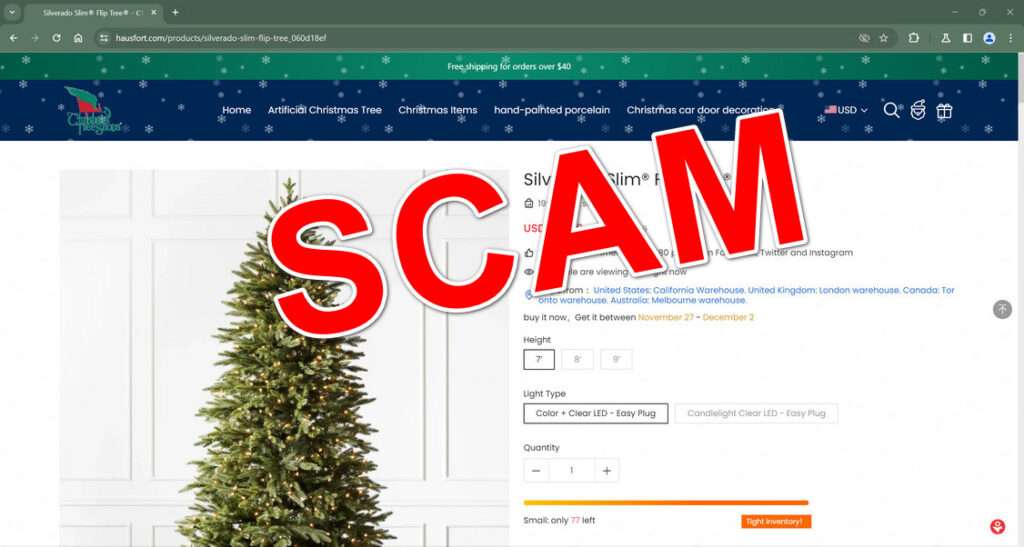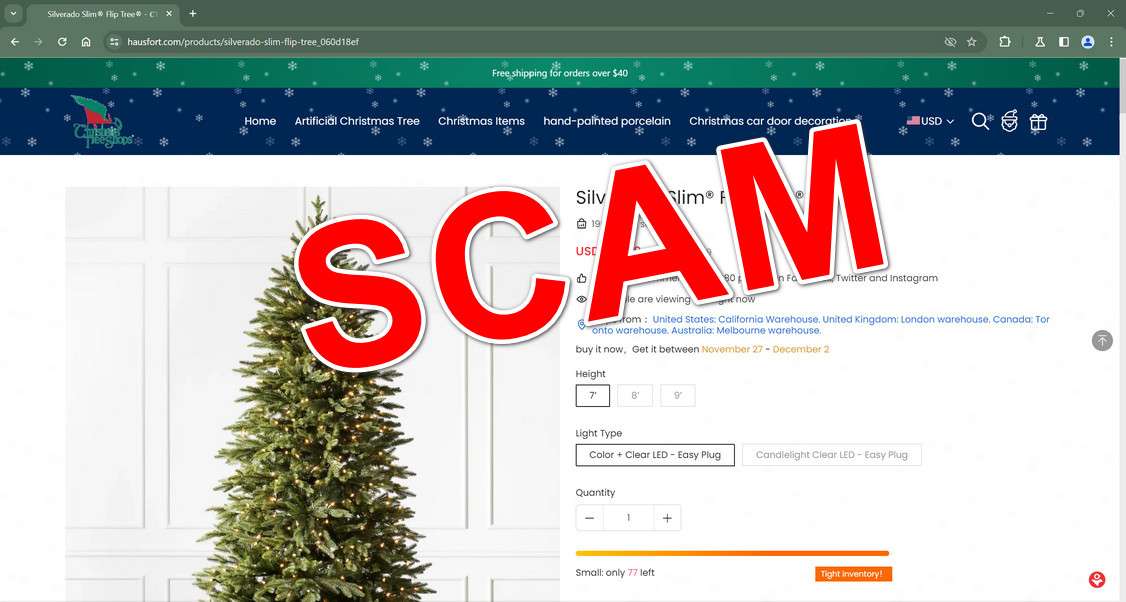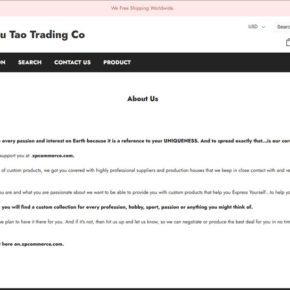Scammers are promoting fake Christmas Tree Shops store closing sales online to capitalize on the retailer’s real-life demise. Read on to learn how these fraudulent ads and websites aim to trick nostalgic shoppers by impersonating the newly-shuttered brand.
- Overview of the Christmas Tree Shops Store Closing Scam
- How the Christmas Tree Shops Store Closing Scams Work
- Red Flags of the Fake Christmas Tree Shops Sites
- How to Identify the Fake Christmas Tree Shops Closing Sale Scam on Facebook
- How to Spot the Fake Christmas Tree Shops Closing Sale on Instagram
- What to Look For to Detect the Scam on TikTok
- What to Do if You Are Victimized by a Fake Closing Sale
- Frequently Asked Questions About the Fake Christmas Tree Shops Closing Sale Scam
- The Bottom Line

Overview of the Christmas Tree Shops Store Closing Scam
With the recent permanent closure of all Christmas Tree Shops retail locations in August 2023, online scammers have taken advantage by creating fake “going out of business” sales to deceive shoppers.
They are heavily promoting these fraudulent closing sales through sponsored posts and ads on social platforms like Facebook, Instagram, and TikTok. These compelling ads feature the real Christmas Tree Shops logo and showcase products like ornaments and home decor with claims of up to 90% off discounts.
When victims click on these ads, they are redirected to sophisticated fake ecommerce websites designed to precisely mimic the look and feel of the real Christmas Tree Shops online store. The scam sites display the brand name, logos, product catalogs, web design elements, and images stolen from the now-defunct retailer.
Of course, these sham sites have absolutely no connection to Christmas Tree Shops itself and are only impersonating the closed company to scam consumers. To hook shoppers, they tout unrealistic blowout discounts up to 90% off all items, with prices absurdly marked down compared to normal retail costs.
These scam websites also use other deceitful tactics to appear legitimate and trustworthy. These include fabricating customer service forms, reviews, return policies, security badges, mailing addresses, phone numbers, and even stealing legal pages from the real Christmas Tree Shops site.
Unfortunately, victims who get tricked into placing orders and entering payment information on these fraudulent Christmas Tree Shops websites never receive any merchandise. The criminals behind the scam sites simply take the money and disappear, leaving customers empty-handed.
This leaves unwitting shoppers who fell for the scam with no products, no way to contact the fake stores, and no recourse to recover lost funds or secure sensitive personal data now stolen by scammers. These elaborate sham closing sales are deceiving nostalgic shoppers by impersonating a beloved discount retailer now permanently out of business.
How the Christmas Tree Shops Store Closing Scams Work
These fraudsters are heavily promoting their cons via targeted sponsored ads and posts on social platforms. Here is how the scam operates:
Step 1: Hook Shoppers with Social Media Ads
The scam begins with fake Christmas Tree Shops ads on Facebook, Instagram, TikTok, YouTube, and Pinterest boasting blowout discounts of 50-90% off everything at the store closing sale.
These compelling ads use the real news of the impending shutdown to lend credibility and feature the Christmas Tree Shops logo. Headlines like “Going Out of Business Sale – Up to 90% Off!” are used to grab attention. Intrigued shoppers then click these ads.
Step 2: Redirect to Elaborate Fake Ecommerce Sites
The social media ads redirect victims to sophisticated fake websites designed to precisely mimic real online Christmas Tree Shops stores down to the finest details.
These scam stores prominently display the company’s logos, name, images, and brand throughout just like a legitimate site. But they have no actual connection to the retailer.
Step 3: Hook Shoppers with Unrealistic Discounts
To induce customers to purchase, the scam websites promote deep discounts like 90% off all products. Prices are shown artificially reduced to absurdly low levels compared to normal prices.
These unrealistic discounts create false urgency to buy quickly before missing out on the purported deals.
Step 4: Build Trust Through Fake Policies and Badges
The scam stores utilize trust-building tactics like:
- Posting fake return, shipping, privacy policies copied from real sites
- Using fake security seals and certifications
- Listing made-up phone numbers, addresses, and customer service emails
- Fabricating positive testimonials praising the deals and site
This fosters confidence the site is a genuine retailer.
Step 5: Steal Entered Payment and Personal Information
During checkout, victims are prompted to enter payment details like credit card info as well as personal data including name, address, email, and phone number.
The scammers collect this sensitive information to sell on the dark web or misuse via identity theft.
Step 6: Never Ship Ordered Products
After submitting orders and personal details, customers never receive the deeply discounted products shown. The elaborate fake stores soon disappear after collecting enough payments.
This leaves victims out of pocket with no items, no way to contact the “company” and no recourse to recover lost money or compromised information.
Red Flags of the Fake Christmas Tree Shops Sites
While mimicking legitimate websites closely, these fraudulent shops have telltale signs to watch for:
- Too Good to be True Discounts – Real store closing sales will not offer absurd discounts like 90% off entire inventory. Massive discounts are a huge red flag.
- Stock Photos – Products often use generic images taken from other sites rather than unique store photos.
- Missing Contact Info – No phone number, physical address or support emails beyond a simple contact form.
- Vague “About Us” Page – Little specific company information or history and a generic business name like “ChristmasTreeClearance” instead of the real business name.
- Grammatical Errors – Scam sites often have spelling and grammar mistakes.
- Disabled Cookie Popups – Scam stores insist cookies be enabled to allow tracking versus legitimate sites.
- Unable to Verify SSL Certificate – Browsers can’t validate security certificates from scam sites.
- New Domain Registration – Fraud store domains are recently registered and lack reputation or reviews.
- No Social Media Presence – Unlike the real brand, scam sites lack any social media accounts.
Shoppers should steer clear of such dubious sites and only purchase directly from the retailer’s official website.
How to Identify the Fake Christmas Tree Shops Closing Sale Scam on Facebook
Facebook is a prime platform fraudsters are using to promote the Christmas Tree Shops scam through sponsored posts and ads. Here’s what to watch out for:
- Ads boasting a “Christmas Tree Shops Store Closing Sale” or “Going Out of Business Clearance” designed to grab attention.
- The ads incorporate the real Christmas Tree Shops logo and brand images to appear legitimate.
- Links in the Facebook post and ads go to an unfamiliar website address rather than the official Christmas Tree Shops site, which no longer operates.
- The Facebook Page posting the ad has no posting history, followers or engagement. These scam Pages are often recently created.
- No legitimate contact information, customer service channels or physical address are provided on the website.
- Researching the scam website domain shows it was recently registered under a Chinese registrar rather than a Christmas Tree Shops entity.
Avoid engaging with any Facebook ads for the closing sale that display these red flags. Christmas Tree Shops is permanently closed.
How to Spot the Fake Christmas Tree Shops Closing Sale on Instagram
Scammers are flooding Instagram with posts mimicking the retailer’s defunct account and promoting closure discounts. Signs it’s a scam:
- Suspicious video or image ads on Instagram showcasing the Christmas Tree Shops logo and “Store Closing Sale”.
- The Instagram accounts posting the scam ads have no posts, followers or engagement history.
- Clicking the link in the account’s bio goes to an unfamiliar ecommerce domain unaffiliated with Christmas Tree Shops, which is closed.
- The site uses generic product images instead of unique store photos.
- No legitimate customer service, help desk or contact information is provided.
- The domain was recently registered under a registrar in China with no ties to the shuttered Christmas Tree Shops brand.
Christmas Tree Shops is permanently out of business. Any ads for closing sales are fraudulent.
What to Look For to Detect the Scam on TikTok
Similar to Facebook and Instagram, TikTok is rife with Christmas Tree Shop scam ads often using video. Signs it’s fraud:
- Flashy video ads promising blowout closing discounts for the shuttered Christmas Tree Shops.
- Clicking the link goes to an unfamiliar ecommerce site unaffiliated with the closed retailer.
- The website uses generic images rather than unique store photos.
- No verified company information or ways to contact support are listed.
- The domain isn’t registered to Christmas Tree Shops.
- The TikTok account posting the ad has no previous videos or engagement.
Carefully scrutinize any TikTok ads about Christmas Tree Shops discounts, as the company is permanently out of business. These are scams seeking to profit from the brand’s demise.
What to Do if You Are Victimized by a Fake Closing Sale
If you placed an order or submitted payment information to one of these fraudulent Christmas Tree Shops scam websites, take these actions to limit damages:
Step 1: Contact Your Bank or Credit Card Provider Immediately
Alert them you shared your card details on a scam website and request any unauthorized charges be blocked. Ask to be issued a new card number.
Step 2: Report the Incident to the FTC
File a scam complaint with the Federal Trade Commission via their online reporting form or by phone at 1-877-FTC-HELP. Provide transaction and website details.
Step 3: Explore Options to Recover Lost Funds
Ask your bank if any fraud protections, insurance or chargeback mechanisms can recover your lost money. Supply all details of the transactions and fraudulent retailer information.
Step 4: Monitor Accounts Closely
Carefully monitor bank and credit card statements and credit reports over the next few months for any indication of identity theft or misuse of your personal information provided to the scammers.
Step 5: Warn Others About the Scam Site
Post details about the scam website on social media and reporting sites like Ripoff Report to prevent additional victims. Share your experience to educate others.
Step 6: Strengthen Security Settings
Update passwords, enable two-factor authentication, limit personal data sharing on accounts and exercise more caution to better protect your data. Avoid clicking ads and links before verifying legitimacy.
Frequently Asked Questions About the Fake Christmas Tree Shops Closing Sale Scam
Have you seen ads for a Christmas Tree Shops store closing sale with huge discounts? Be cautious as these could be fraudulent. Here are answers to frequently asked questions about this scam trying to profit from the retailer’s real-life demise.
What is the Fake Christmas Tree Shops Closing Sale Scam?
This scam involves fake social media ads and websites promoting a Christmas Tree Shops closing sale with unrealistic discounts up to 90% off. However, Christmas Tree Shops is permanently closed, so any such sale is fraudulent. The scam aims to trick shoppers mourning the store’s closure into providing payment and personal information.
Where Are These Fake Closing Sale Ads Being Promoted?
The ads are proliferating on platforms like Facebook, Instagram and TikTok. Scammers create fake accounts and sponsored posts using the Christmas Tree Shops logo and images of merchandise to appear legitimate and target nostalgic shoppers.
How Do the Scammers Profit from the Fake Sale?
The scam websites collect payment and personal information during checkout, but never ship any products. The scammers profit by pocketing victims’ money and stealing sensitive data like names, addresses and credit card numbers to sell on the dark web or misuse via identity theft.
What Techniques Do the Sites Use to Look Real?
The fake sites copy layout, product catalogs, policies, contact forms and other details from the real Christmas Tree Shops website to appear authentic. They also fabricate security badges, customer reviews, corporate information, mailing addresses and phone numbers.
What Are Red Flags of a Scam Closing Sale?
Huge sitewide discounts over 50% off, recently registered domains, grammatical errors, disabled cookie popups, inability to verify SSL certificates, and lack of legitimate contact details or social media presence indicate a scam.
What Should I Do If I Entered Payment Information?
Immediately contact your bank or credit card company to block any unauthorized charges. Report the incident to the FTC and monitor your statements closely for signs of identity theft. Avoid further engagement with the scam website.
Can These Fake Sites Be Taken Down?
While illegal, most are based overseas, evading prosecution. Reporting them to consumer protection agencies may succeed in getting scam storefronts removed.
How Can I Avoid These Scam Closing Sales?
Remember that Christmas Tree Shops is permanently closed. Any advertisements for closing sales are fraudulent. Avoid unfamiliar websites, too-good-to-be-true deals, and ads using the Christmas Tree Shops brand. Trust your instincts.
The Bottom Line
As the impending closure of Christmas Tree Shops provides an opportunity, fraudulent ads for fake blowout store closing sales have appeared online to target bargain hunters. But the scam websites merely aim to pocket payments and steal personal data rather than ship any deeply discounted products advertised.
However, consumers can protect themselves by learning to recognize telltale signs of scam sites, such as unbelievable pricing, newly created domains, and lack of legitimate contact details or company information. Those unfortunate enough to get ensnared by a fake closing sale scam can also take proactive countermeasures like reporting the fraud and monitoring accounts closely to limit future abuse of their information.
The sage advice for shoppers remains to stick with trusted retailers, research unfamiliar sites, read reviews, and follow instincts to avoid the evolving array of too-good-to-be-true online shopping scams. Savvy shoppers can steer clear of such sophisticated frauds seeking to capitalize on the imminent demise of a well-known retail chain.



![Remove News-kotuvu.cc Pop-up Ads [Virus Removal Guide] 8 McAfee scam 4](https://malwaretips.com/blogs/wp-content/uploads/2023/08/McAfee-scam-4-290x290.jpg)
